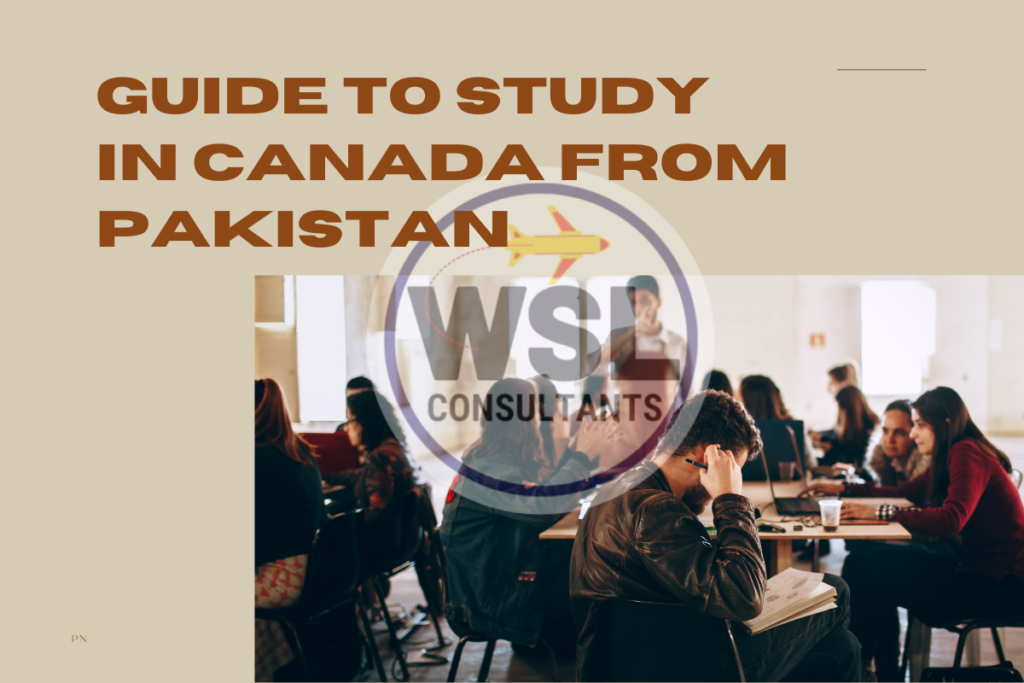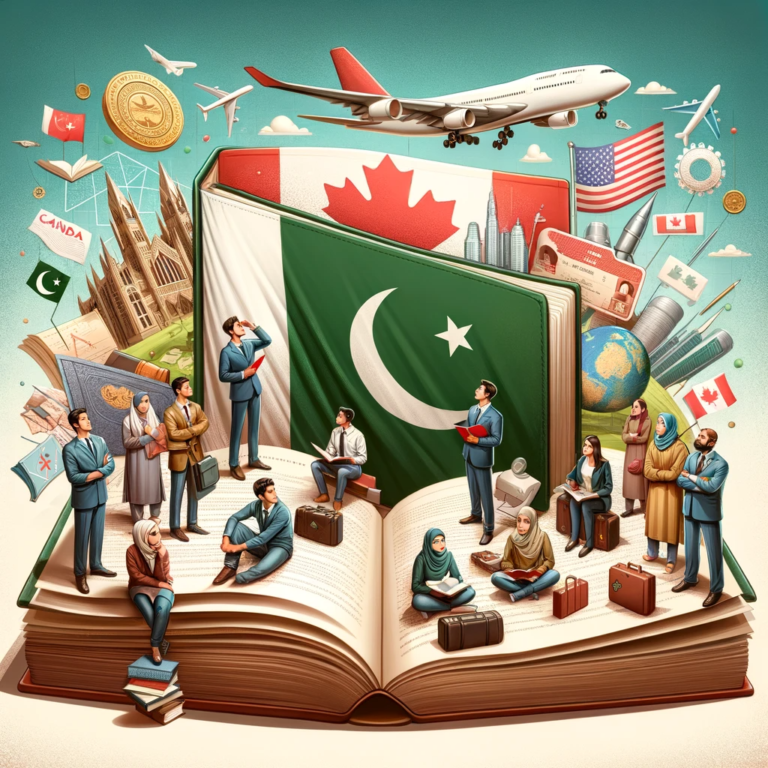Guide to Study in Canada from Pakistan

Embarking on a journey to study in Canada from Pakistan is an exciting and transformative endeavor. This guide aims to provide a comprehensive roadmap for Pakistani students, navigating through the intricate process of pursuing higher education in the Great White North. From choosing the right academic program to understanding admission requirements and cultural adaptation, each aspect of this guide is crafted to ensure a seamless transition for aspiring students. Canada, renowned for its world-class education system and cultural diversity, offers a unique learning experience. With insights into financial planning, legal considerations, and job opportunities post-graduation, this guide equips Pakistani students with essential information to make informed decisions for a successful study in Canada.
Benefits of Study in Canada
Quality Education
Study in Canada not only provides students with a globally recognized education but also offers an enriching experience characterized by academic excellence and cultural diversity. Renowned for its high-quality education system, Canadian institutions consistently rank among the top globally, providing students with cutting-edge knowledge and skills. The emphasis on research-oriented learning ensures that students are exposed to innovative ideas and practical applications of their studies. Moreover, the multicultural environment fosters a global perspective, allowing students to interact with peers from diverse backgrounds and broaden their horizons. Study in Canada is not just about academic achievement; it’s a holistic experience that encourages personal growth, critical thinking, and adaptability – qualities highly valued in today’s globalized world. From picturesque campuses to supportive academic communities, study in Canada encompasses far more than textbooks and lectures; it is an investment in a well-rounded, internationally recognized education.
Multicultural Environment
Canada’s multicultural environment is a defining feature that sets the country apart as a premier destination for Pakistan students. Renowned for its inclusivity, Canada embraces a diverse tapestry of cultures, creating a rich and vibrant atmosphere on campuses across the nation. The multicultural environment extends beyond the academic realm, permeating all aspects of Canadian society. Students from around the world, including those from Pakistan, find themselves immersed in a welcoming community that celebrates differences and encourages the exchange of ideas. This unique setting not only enhances the overall learning experience but also fosters global perspectives, preparing students to navigate an interconnected world. From cultural festivals to international student organizations, Canada’s commitment to multiculturalism creates an environment where individuals from all backgrounds feel valued, respected, and empowered to thrive academically and personally.
Work Opportunities
Canada provides significant work opportunities for international students, making it an attractive destination for those seeking to enhance their academic experience with practical work experience. Through programs like the Post-Graduation Work Permit (PGWP), students who have completed a program of study in Canada can work for up to three years, gaining valuable professional experience related to their field of study. Additionally, many Canadian universities offer co-op and internship programs, allowing students to integrate periods of work into their academic curriculum.
The country’s strong economy and diverse industries offer a broad spectrum of employment possibilities. From part-time work during studies to full-time opportunities post-graduation, international students, including those from Pakistan, have the chance to apply their knowledge in real-world settings. This not only provides financial support but also enhances their resume, making them more competitive in the global job market.
Furthermore, Canada’s commitment to the Global Talent Stream expedites the hiring process for skilled foreign workers, presenting additional avenues for international graduates to secure employment in their respective fields. Overall, the abundant work opportunities in Canada contribute to a well-rounded and rewarding experience for students beyond the confines of the classroom.
Considerations Before Making the Decision
Reflect on your academic and personal goals. Consider if the Canadian education system aligns with your aspirations and preferences. Evaluate the financial aspects, including tuition fees, living expenses, and available scholarships or financial aid. Understanding the costs involved is crucial for planning. Think about your long-term career plans. Research the job market in your field of study in Canada and assess if it aligns with your career goals.
Understanding the Canadian Education System
Understanding the Canadian education system is crucial for students planning to pursue their studies in this diverse and academically renowned country. The system is organized into primary, secondary, and tertiary levels, with post-secondary education playing a prominent role.
- Primary and Secondary Education: The Canadian education journey typically begins with primary and secondary education, spanning from kindergarten to grade 12. Provincial and territorial governments oversee the curriculum, ensuring a consistent standard of education across the country.
- Post-Secondary Education: Following secondary education, students can opt for post-secondary education at colleges, universities, or technical institutes. Canada boasts a broad spectrum of institutions offering various degrees, diplomas, and certificates.
- Degree Programs: Universities in Canada offer undergraduate and graduate degree programs. The Bachelor’s degree is the common undergraduate qualification, followed by Master’s and Doctorate degrees at the graduate level.
- Colleges and Technical Institutes: Colleges and technical institutes focus on practical and hands-on training, offering diploma and certificate programs. These institutions are particularly valuable for students seeking applied and vocational skills.
- Language of Instruction: English and French are the primary languages of instruction in Canadian institutions. Proficiency in the language of instruction is crucial, and language enhancement programs are often available to support international students.
- Quality Assurance: The Canadian education system is known for its rigorous quality assurance mechanisms. Institutions are regularly assessed to ensure they meet high academic standards, contributing to the global recognition of Canadian qualifications.
- Post-Graduation Work Opportunities: A notable feature of the Canadian education system is the provision of post-graduation work permits (PGWP). This allows Pakistani students who have completed eligible programs to work in Canada and gain valuable professional experience.
- Cultural Diversity: Canada’s commitment to multiculturalism is reflected in its educational institutions. Students experience a diverse and inclusive environment, fostering cross-cultural understanding and enriching their study in Canada.
Understanding the Canadian education system involves navigating these components, each contributing to a comprehensive and globally recognized learning experience. Whether pursuing a degree, diploma, or certificate, students from around the world, including those from Pakistan, find a welcoming and high-quality study in Canada.
Admission Process
Thoroughly research potential universities. Consider faculty expertise, campus facilities, and extracurricular opportunities to find the best fit. Follow the application procedures outlined by each university. Pay attention to deadlines and submission requirements to ensure a smooth application process. Prepare all necessary documents, such as academic transcripts and letters of recommendation. Meeting deadlines and submitting comprehensive documents is crucial.
Financial Planning
Understand the tuition fees of your chosen program and budget accordingly. Consider any additional costs related to books, materials, and extracurricular activities. Factor in living expenses, including accommodation, food, transportation, and personal expenses. Creating a detailed budget helps in financial planning. Explore scholarship opportunities offered by universities and external organizations. Financial aid can significantly ease the financial burden of study in Canada.
Student Visa Application
Ensure you meet the eligibility criteria for a student visa, including acceptance from a designated learning institution in Canada. Prepare the required documents, such as a letter of acceptance, proof of funds, and a valid passport. Follow the application guidelines carefully for a successful outcome. Apply for a student visa well in advance of your intended start date. Be aware of the processing time and adhere to all visa application procedures.
Cultural Adjustment
Prepare for cultural adjustments by learning about Canadian customs and social norms. Universities often provide support services to assist with cultural adaptation. Take advantage of support services offered by universities, such as language assistance, counseling, and cultural exchange programs. Explore part-time work opportunities during your study in Canada to gain experience and support your finances. Be aware of regulations and guidelines for Pakistani students.
Healthcare and Insurance
Healthcare and insurance form a crucial support system for Pakistan students to study in Canada, including those from Pakistan. Canada’s publicly funded healthcare system ensures that students have access to essential medical services through provincial health insurance plans. Upon arrival, students are required to apply for provincial health coverage, providing coverage for a range of medical services. However, it’s important to note that while these plans cover many expenses, certain costs, such as prescription medications and dental services, may not be fully included. To address these gaps, many students opt for supplementary health insurance, offered by private providers. This additional coverage provides financial protection and ensures a more comprehensive healthcare experience, offering peace of mind for international students as they navigate their study in Canada. Understanding the nuances of both provincial health plans and supplementary insurance is crucial for students to proactively manage their health and well-being throughout their study in Canada.
Accommodation Options
When it comes to accommodation options for international students in Canada, there are various choices to suit individual preferences and budgets. Many universities offer on-campus housing, providing a convenient and immersive experience within the academic community. These residences often include furnished rooms, shared common spaces, and amenities, offering students a supportive environment.
Off-campus housing is another popular option, allowing students to rent apartments, shared houses, or even homestays. This provides greater flexibility and independence, and students can choose locations that align with their preferences and lifestyle.
Homestays, where students live with local families, offer a unique cultural experience and additional support for those adjusting to a new country. This option often includes meals and a chance to engage with Canadian customs and traditions.
For more cost-conscious students, shared accommodations, such as renting a room in a house or apartment with other students, can be a practical and economical choice. This fosters a sense of community while managing expenses.
Regardless of the option chosen, it’s essential for students, including those from Pakistan, to plan and secure accommodation well in advance of their arrival in Canada. This ensures a smooth transition and allows them to focus on their studies and immerse themselves in the Canadian academic experience.
Exploring Canada Beyond Academics
Take advantage of travel opportunities to explore Canada’s natural beauty and vibrant cities. Plan your trips during breaks to make the most of your time in the country. Immerse yourself in Canadian culture by attending events and festivals. This not only enhances your experience but also allows you to connect with the local community.
Success Stories
Read inspiring success stories of Pakistani students who have successfully navigated the challenges of study in Canada. Learn from their experiences and insights. Discover how these students overcame obstacles, adapted to a new culture, and achieved their academic and personal goals. Their stories serve as motivation for aspiring students.
Conclusion
In conclusion, study in Canada from Pakistan is a significant undertaking with numerous benefits. By carefully considering various factors, from admission processes to cultural adjustments, you can make an informed decision that aligns with your academic and personal goals.
FAQs
- What financial aid options are available for Pakistani students in Canada?
- Explore scholarships offered by universities, government programs, and private organizations.
- Can I work part-time while study in Canada?
- Yes, international students are allowed to work part-time during their studies.
- How can I prepare for language proficiency tests like IELTS or TOEFL?
- Utilize online resources, practice tests, and dedicate sufficient time to preparation.
- What healthcare options are available for Pakistani students in Canada?
- Familiarize yourself with the Canadian healthcare system and the health insurance options provided by universities.
- How can I overcome homesickness while studying abroad?
- Stay connected with friends and family through technology and actively participate in social activities.






